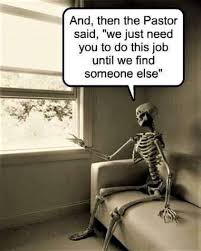The Pastor’s Update:#11
“They need me and would take me in a heartbeat.”
This story prompted me to reflect on the level of engagement of most parishioners in the church's life. It's no secret that the church relies heavily on volunteers who dedicate countless hours of their time, expertise, and energy for the betterment of the church. Running a church entails much more than meets the eye. Church administration is involved, but most churches do not have the budget for staffing. Therefore, compassionate parishioners and volunteers step up and keep the church functioning by becoming a Board of Trustee member, an auxiliary body member, or simply stopping by the church occasionally to do whatever is necessary.
Many of us have likely come across the popular Christian meme on social media featuring a skeleton sitting on a couch with a speech bubble that says, 'And then the Pastor said, we just need you to do this job until we find someone else.' While this may be an exaggeration, the underlying message is not only the perception that once someone is assigned a task in the church, they can never quit or retire but also the issue of burnout. As human beings, we are susceptible to burnout, and tasks that once brought us joy can become burdensome. It is the responsibility of church leadership to prevent this from happening to those involved in the church's ministry and to encourage volunteers to practice self-care when their responsibilities become overwhelming.
As I continued my conversation with the young man I mentioned above, I discovered he was feeling empty and considering returning to his firehouse. When asked if that was an option, he replied, "They need me and would take me in a heartbeat." His answer made me reflect on a particular aspect of our church mindset. We have developed a unique meaning for the terms "active church," "successful church," or "vibrant church." We often measure success by evaluating our church programs and events, focusing on how many people are attending and what the impact is on the church budget. The church programs and events aim to bring the community members together and strengthen the existing bond. However, the problem is that no matter how hard a church tries, its programs cannot compete with the experiences offered by Broadway shows, concerts, catering halls, TED Talks, etc. People with more refined tastes may choose to spend their time and money elsewhere.
Additionally, the abundance of events at a church may lead to phrases like “there are too many events at this church,” “we were just there for their picnic, now they have a dinner dance,” and “I have only X amount of money or time budgeted for the community affairs, and that budget was exhausted nine months ago.” These thought patterns create the mentality: “It's just a church event; I'll attend the next one - this church is not going anywhere.” This phenomenon is called apathy.
I'm writing to you today not to lecture you on implementing self-care to avoid burnout, to criticize you for being indifferent, or to encourage you to start attending our events. I'm writing to remind you of the purpose of the church. If we don't understand its purpose, we might start treating it as a social club where we just show up for a while then feel disconnected, and leave. We might begin to feel valued, especially if those in our immediate circle don't validate us. We might start coming to escape our difficult spouses. We might come simply because we don't have anything else to do. In other words, we start making the church about us instead of about God.
On the first Palm Sunday, the synoptic Gospels record that Jesus cleansed the temple and reminded everyone of God’s message, “My house shall be a house of prayer.” When we try to stay true to Christ’s teaching then we see that the church is where we nurture a relationship with God and our fellow Christians. It’s where we examine how God works in our lives and how we respond to God’s invitation. We come here to nurture our souls by worshiping God. Worship teaches humility and self-control by reminding us that there is someone greater than us. In the church, we separate ourselves from the ordinary and enter into the realm of the sacred. Like the disciples, we sit with Jesus and participate in the mysteries of His Last Supper. We receive atonement for our sins and return to the world recharged spiritually.
As church leaders, we may give off the impression that, just like the firehouse we need you and will take you back in a heartbeat. But when we recognize that it is both ourselves and others who need God, then our spiritual growth and transformation begin. The book of Psalms beautifully captures this sentiment, and I encourage you to pray with Psalm 63:
1 O God, you are my God; earnestly I seek you;
my soul thirsts for you;
my flesh faints for you,
as in a dry and weary land where there is no water.
2 So I have looked upon you in the sanctuary,
beholding your power and glory.
3 Because your steadfast love is better than life,
my lips will praise you.
4 So I will bless you as long as I live;
in your name I will lift up my hands.
5 My soul will be satisfied as with fat and rich food,
and my mouth will praise you with joyful lips,
6 when I remember you upon my bed,
and meditate on you in the watches of the night;
7 for you have been my help,
and in the shadow of your wings I will sing for joy.
8 My soul clings to you;
your right hand upholds me.
This Sunday, we read Jesus’s parable of weeds among the wheat recorded in the Gospel of Matthew. According to the Orthodox Study Bible, Christ gives attention to the enemy who has sown his seed among the seed of Christ. As falsehood came after truth and false prophets came after the true prophets, so the Antichrist will come after Christ. Just as the weeds first appear similar to wheat, so the devil fashions his lies to resemble the truth. That the devil sows while men slept indicates that heresy and lies creep in when people are apathetic.
This parable also explains why the Church neither condemns nominal members, nor judges those outside the Church. Just as wheat would be destroyed in weeding out the tares, so also, many people who might ultimately find salvation would otherwise be lost if condemned before Christ's judgment.” (Copyright © 2008 by St. Athanasius Academy of Orthodox Theology.)
Prayerfully










 RSS Feed
RSS Feed
